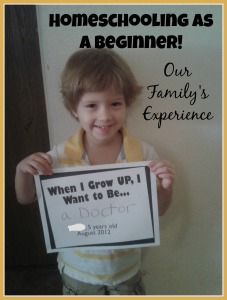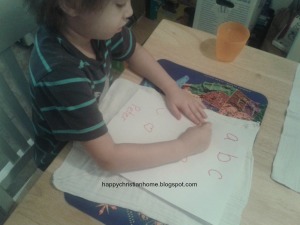Homeschooling as a Beginner
Homeschooling as a Beginner:
Last week at the library, my children were playing when another mother struck up a conversation with me. “Do you homeschool?” It was earlier in the day, and my kids are seven, five and two. At least the seven-year old would normally be in school and maybe the five year old, so that may have prompted her question. I confirmed yes, we do homeschool. She began to compliment their demeanor and their ease of interacting with her and shared that she figured they were homeschoolers because of this trait. Of course, I beamed, because I feel this is an unexpected benefit of homeschooling (contrary to the common “awkward homeschooler” stereotype).
Homeschooling is becoming increasingly popular, and has had a big upswing since the late 1990’s. From various websites, I determined anywhere from 3-4% of students in the United States are homeschooled (somewhere in the neighborhood of 1.5 million children!) Lots of parents are deciding to homeschool these days for various reasons. So why did we decide to homeschool?
Why We Started Homeschooling
When my now seven year old began to learn his letters, numbers, shapes and colors at the seemingly early age of two, followed by reading fluently at three and a half, I knew conventional schooling might not be the best fit for us. Two and a half years later, my daughter had developed almost exactly in the same manner as my son had. We have always tried to create a learning-rich environment in our home, but never quite knew where that would lead for our children. We weren’t pushing them to learn and be “brainy babies” by any means, but they definitely thrived and made us realize we shouldn’t put our children in a box as far as educational development was concerned.
For us, because they had already proven learning at home was advantageous to them, we decided intentional homeschooling would be a natural extension of our home environment and parenting. It made sense. We could tailor their education to suit their specific needs.
Other factors for us include our desire to help our children grow strong in their faith (not saying you can’t do that with children in conventional school by any means, it was just a personal choice for us). Also, we have quite a few food allergies and sensitivities to deal with, so concerns about health and safety were certainly major factors in our decision.
How We Started Our Homeschooling Journey
When my son got close to the age he would start kindergarten, I began to look into our state’s homeschooling laws. (I think I “Googled” our state + homeschooling, and came across a very helpful and informative site specific to our state). I learned I basically had to do nothing until he turned six (he was five at the time), so we started “doing kindergarten” the fall after he turned five. He turned six the following spring, so I filed an affidavit of intent to homeschool with our county (a really simple process, as I just had to download the form off this website, and fill in his basic information and mailed it in with a copy of his birth certificate). It was sent back to me surprisingly fast with a letter wishing us well on our homeschool journey. (Thankfully, our state is very friendly to homeschoolers). Be sure to check the laws and guidelines for your state before you get started, as they can vary widely.
Our Homeschooling Space
If you search Pinterest for “homeschool spaces” you’re bound to come across some stunning set-ups. You probably won’t find our space anywhere on Pinterest though! We don’t have a dedicated “homeschool room” or even desks for the children, since we live in a tiny apartment and space is at a premium. Our formal instructional time happens around the kitchen table, our family computer, the living room, and even the kids’ bedroom! We have shelving in our dining room to stash our notebooks, workbooks, and other “educational materials” in a semi-organized manner (we have an extremely busy and very curious two year old in the house, so organization is not always easy to maintain!) We have some preschool/kindergarten level posters on the wall in the dining room and a giant map of the world in our living room.
Homeschooling environments can take many shapes and forms, and you have to find what you’re comfortable with and what works for your space and family. I think it’s unfair to yourself to expect that a room in your home will need to resemble an elementary school classroom in order for you to be successful. If you have the extra room and the time and money to do it, though, and it makes you happy and gives you more confidence and peace, then by all means, create that space for your children, but it certainly isn’t necessary (in my humble opinion)! Some parents even take their school time outdoors!
Our “Average” Homeschooling Day With Little Ones Around
I really haven’t figured out what this looks like yet! When we started, we had a newborn in the house. He napped frequently, so during one of his many naps, we would have our “school time”. At first, we didn’t have a set curriculum or homeschooling philosophy we were following, so many of our lessons were pieced together from various sources. (For a sampling, you can see my Homeschooling Ideas and Resources Pinterest board).
As the baby grew, our approach had to change. I still tried to time our lessons to be during his naps (or before he woke up if he slept late), but since he ultimately dropped down to one nap a day, and sometimes nap time would need to be used for other things, I had to figure out how to keep him busy during our lesson. Different activities worked for us, including having him at the table with us with a snack, setting up a special cubby of toys for him to explore, and (I’m being candid here) letting him watch television (though this tended to distract the older kids more than anything). Sometimes, though, we would have to space out what we wanted to cover over the course of the day. (Interruptions happen!)
Now, I’m expecting our fourth child. As happened in previous pregnancies, the first trimester was quite difficult for me. I put our “formal homeschooling” on hold for a bit so I could take care of myself physically. This year, we are using the Charlotte Mason Method (Simply Charlotte Mason has been the best fit for us so far). I love how it is such a broad “curriculum” and includes a lot of classic literature, music studies, art studies, hymn studies as well as Scripture memorization. And it is fairly easy to track down books at the library, thus appealing to my frugal nature! Simply Charlotte Mason has a “light schedule” for those times when you really need it, and that’s what we’re doing right now. Our children are enjoying the exposure to different areas (even the ones that may seem like they’d be over young children’s heads).
What About Interest-Led Approach in Homeschooling?
It can be a challenge to juggle homeschooling with older children and having a baby or toddler in the house (or a wee one in the womb), but it’s only for a season and I honestly haven’t seen the older children suffer from not having my full educational input constantly. There have been times when we’ve taken more of an “unschooling” approach (an interest-led approach to learning) and really, children are always learning something valuable, it just may not look the same as classroom learning or be in line with any specific guidelines or philosophy. I’ve had my older children working on workbooks while I’m making dinner without any prompting from anyone. They just wanted to! We’ve also done more computer-based learning when the littlest one has required more of my attention. You really do need to think outside the box sometimes and let some expectations go when you are educating your littles (unless you thrive on stress- ha)!
Homeschooling Outside the Home
Our first year of homeschooling was mostly spent keeping to ourselves and trying to figure out what worked for us. We had many outings to the library and the natural history museum, and pretty much the only play dates we had were with family. We just had fun at home and didn’t stress about making friends or getting involved with co-ops or other groups. In first grade though, I felt a need to connect with other homeschoolers in our area. It was for me as much as for the children! I needed support. It took us a while to find a group we were comfortable with, but when we did, we began to really enjoy the outings and meet-ups. I was concerned about my son getting enough social interaction, as he seemed to need more than I needed personally (introvert here). But I noticed when I provided the opportunities to meet other children, he didn’t necessarily connect with them. A lot of times, it was during outings when there was much to see and do, so I finally limited our meet-ups with other homeschoolers to relaxed environments where the grown-ups could chat and the kids could play and get to know each other. We’ve connected with other families through a group on Facebook, Meetup.com, and even met one local family through a Charlotte Mason forum! You know what, though? Their best friends are still ones they have made at church!
Joining a Homeschooling Co-op
As far as co-ops are concerned (where different parents facilitate various subjects and rotate responsibilities), we have yet to need one. I suppose as the children progress and begin to need more advanced input for their areas of study that will be something we may pursue (or if we begin to follow a different philosophy). Many parents do take advantage of local homeschool co-ops to ease their load and also to contribute if they have an area of expertise.
Lately, we’ve been enjoying programs at the library designed for elementary ages (our library is excellent about creating fun educational opportunities for school age children), as well as programs designed for the younger ones. They meet other children in their age group, and really enjoy interacting with the adults who facilitate the programs. I like the fact that we are involved in our community programs so we can build relationships near us- many of the homeschool events took place 20-30 minutes away or more. Our library is right in our own neighborhood.
Scouting the Internet for Homeschooling Ideas
If you are considering homeschooling, scour the internet for ideas. Something you will notice is every homeschool is different! Yours will not look like mine and vice versa, and you certainly shouldn’t expect it to look like the glamor you see on Pinterest (though, who knows? It might). There are as many different awesome ways to homeschool as there are families!
More thoughts on homeschooling:
Our First Year of Homeschooling
Have you considered homeschooling? Is anything holding you back from settling on a decision? Let’s have a discussion!
Becky is a wife of eight years and stay at home mom to three young children. She aspires to encourage women in Biblical truth on her blog, Happy Christian Home













Becky,
I always thought it took a super enormous amount of strength (beyond my capabilities) to be a homeschool mom. My days were filled with the baby as the other two were off to elementary school. Then there was the homework when they came home and all the other things moms do being chief cook, maid service, nanny, taxi, etc. What I didn’t see was that all the above could have been accomplished plus teaching in a homeschool situation.
Then I imagined being ‘stuck’ with all the kids in a homeschooling situation and not feeling well. Or what about my kids not having any outside friends and learning to ‘get along with other kids outside the home’?
I see in your post that all the above could be accomplished and more! At this point my recommendation would be to see how homeschooling fits your household, join the homeschool groups and get out there to observe and interact in the world…not just learn about it.
Donna Perugini recently posted..Homeschooling as a Beginner
See, Donna, it seems to *me* to be more stressful to have to send kids off everyday, pick them up, help with homework (I remember my mom being unhappy sometimes with my homework when I needed help because as she said, “I already went to school! Why should I do your schoolwork too?” Lol! She had a good point, though!) Packing lunches, teacher conferences, etc.
I think it really just depends on which route you choose, because there is anything from extremely rigorous studies to unschooling (which, I’ll admit, can actually be much more involved than following a boxed curriculum or something depending on the child’s interest). It absolutely needs to be tailored to your family’s needs. I think people shy away from homeschooling because they think it’s supposed to look like “school at home” and that’s just not the case. They think 6-8 hrs a day trying to keep their child sitting at a desk or what-have-you. My actual “hands-on” time is usually 1-2 hours. That dynamic will probably change as we admit more students (hee hee), but at the same time, the older ones will be more independent. They could even help! (You learn best when you teach something, right?)
I love having them home and seeing how they learn all the time! And I look forward to seeing how our homeschool will change with FOUR children!
Becky recently posted..Five Ways to Show Support for Children’s Ministry Workers